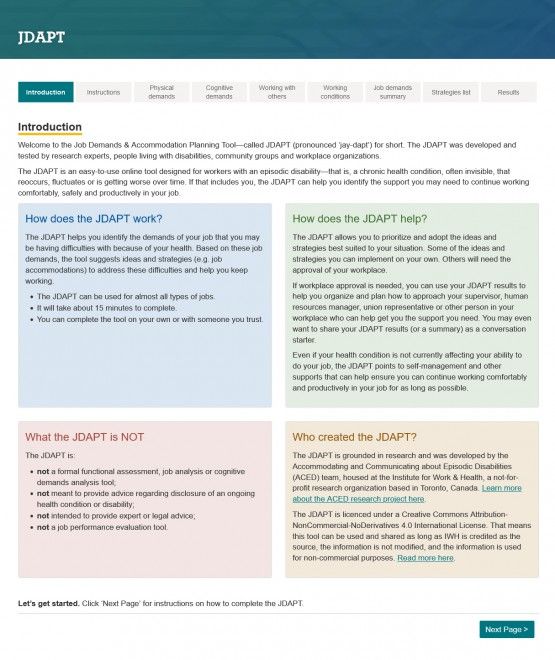The Job Demands and Accommodation Planning Tool (JDAPT) is a multi-component tool that identifies job demands that are difficult for workers with chronic, often episodic, health conditions. Based on identified job demands, the tool suggests personalized support and accommodation ideas, if needed, that can help these workers continue to work comfortably, safety and productively.
The JDAPT asks people to think about the demands of a job and how they relate to episodic health conditions in four key areas:
- the physical tasks required to do the job (called “physical demands")
- the mental or “thinking” tasks required to do the job (called “cognitive demands”)
- the tasks related to working with others that are required to do the job (called “social demands”), and
- the tasks related to working conditions required to do the job (called “environmental and organizational demands”).
One version is for workers with episodic health conditions and another for the workplace parties who support them. All versions are available in English and French.
The JDAPT is an award-winning tool that was developed and tested through a partnership project housed at the Institute for Work & Health called Accommodating and Communicating about Episodic Disabilities (ACED). The tool's development and evaluation involved research experts, people living with disabilities, community groups and workplace organizations. The tool has been tested across a wide range of physical, mental health and cognitive conditions that can create challenges working.
Who should use this tool
The tool is designed for two main audiences: (1) workers with episodic conditions and (2) supervisors, human resources practitioners, disability case managers, worker representatives and other workplace parties who support people with disabilities,
Episodic conditions are chronic health conditions, often invisible, that can re-occur, fluctuate, or worsen over time. Some examples of episodic conditions include depression, anxiety disorders, multiple sclerosis, arthritis, diabetes, HIV/AIDS, Crohn's, colitis, hepatitis C, chronic fatigue syndrome, migraines, chronic pain and some forms of cancer.
Because episodic conditions are often unpredictable and invisible to others, with symptoms that fluctuate from one period in time to another, they create unique challenges in managing workplace disabilities. In particular, episodic disabilities present challenges to workers, supervisors, disability managers and human resources personnel in communicating about health conditions and about the accommodations needed to support working with these conditions.
The JDAPT is meant to help both workers and workplace parties think about—and talk about—needed supports.
